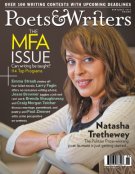There’s a moment in Orhan Pamuk’s novel The Museum of Innocence (Knopf, 2009) when the author writes, “After all, isn’t the purpose of the novel, or of a museum, for that matter, to relate our memories with such sincerity as to transform individual happiness into a happiness all can share?”
While Pamuk’s novel inspired a real-life museum of the same name—which opened in Istanbul this past spring, and is dedicated entirely to Pamuk’s book—literary museums in the United States have historically been harder to find. According to the American Association of Museums, 850 million people visit this country’s nearly 17,500 museums each year—but not one of those museums is solely dedicated to literature. Some, like the Emily Dickinson Museum in Amherst, Massachusetts, celebrate individual writers, while others offer small exhibits dedicated to the written word. The mission of the Washington, D.C.–based American Writers Museum Foundation (AWMF), however, is unique: to establish the first national museum in the United States dedicated to the history and influence of American literature.
“Creating a new national museum to honor our great writers and their works presents a significant challenge,” says AWMF board chairman Malcolm O’Hagan. The current business plan calls for the museum to be built in three phases, with phase one—which will include the development of twenty thousand square feet of space—opening to the public in 2015. Subsequent phases will develop additional space and introduce traveling exhibits and literary programming to help promote the museum. In the meantime, O’Hagan says, a virtual museum has already begun to take shape: Power of the Word, the museum’s first online exhibit, went live this past May. Comprising three galleries—“Leaders,” “Readers,” and “Writers”—the exhibit seeks to make connections among history, identity, and daily life through literature. The idea for the exhibit began with Werner Hein, vice chairman of the AWMF board, who was inspired by the idea of world leaders gathering at the G8, NATO, and Nobel Peace Laureate summits in the United States earlier this year.
“We felt that it would be interesting to explore the influence of literature, particularly American literature, on world leaders—which works have influenced current world leaders, and more important, which works provide the best understanding of America,” says Hein, who is also senior counsel at Mayer Brown, a global law firm that provides office space in Washington, D.C., for the AWMF.
Visitors can learn about the role that reading plays in the lives of leaders such as President Obama, U.K. prime minister David Cameron, German chancellor Angela Merkel, and others. An interactive gallery allows users to suggest books they think world leaders should read; their lists can be submitted via Facebook, Twitter, Instagram, e-mail, or through the website. In the Writers section of the exhibit, featured authors, including novelists T. C. Boyle and Joyce Carol Oates and poets Billy Collins and Nikki Giovanni, offer their own recommendations—often providing personal anecdotes in response to such questions as “Who in your childhood encouraged you to read?” and “Which books by writers of the other G8 countries have affected you?”
While the specific location of the museum is yet to be determined, O’Hagan says that the AWMF’s board concluded early on that Chicago, “with its central location, rich literary history, and generous philanthropic community,” would be the museum’s home. The board plans to find a space that will accommodate readings and lectures, book-club meetings, master classes, and other social gatherings. Exhibits will feature manuscripts, first editions, and various literary artifacts, and will incorporate audio, video, social media, and other interactive platforms.
“Visitors will feel an intimate connection with writers through engaging presentations on their lives,” says O’Hagan. “They will hear poets recite their work and see Nobel laureates deliver their acceptance speeches. They will visit galleries in which themes such as American Quests, American Families, and American Towns and Communities will be explored.”
The project, which has received funding from the National Endowment for the Humanities and the Jerry Stead Family Foundation, has required input from some of the country’s premier arts administrators, publishers, museum professionals, and scholars. The American Writers Museum National Advisory Council includes, among others, Alice Quinn, director of the Poetry Society of America; Max Rudin, publisher of the Library of America; and Elliot Figman, executive director of the organization that publishes this magazine. A literary advisory council has also been established in Chicago to help direct museum planning efforts locally.
“One of our guiding principles is for the museum to be relevant to a large and diverse group of people, and to be experiential,” says board member Helen Sullivan. “This will not be a collecting museum. We intend to push the envelope in terms of being inclusive and in terms of making this a vibrant place where visitors will want to return.”
A second online exhibition is scheduled to go live later this year or in early 2013. To learn more about the American Writers Museum, and to view the current online exhibition, visit www.americanwritersmuseum.org.
Alex Dimitrov is a writer in New York City. His first book of poems, Begging for It, is forthcoming from Four Way Books in March 2013.









